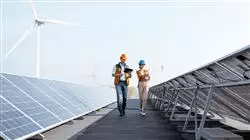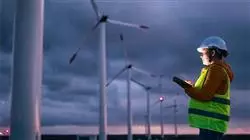University certificate
Scientific endorser

The world's largest faculty of engineering”
Introduction to the Program
Knowing the components and equipment used in steam generators will help you to keep an electric boiler safe”

In any modern society, the supply of electricity is indispensable for its functioning. Without it, hospitals would not be able to operate at their maximum capacity, industries would not be able to provide their services and, taking into account technological advances, web servers would not be able to store and transmit the information that moves the world.
In order for humanity to continue its development, it is necessary to have a number of professionals dedicated to generating and improving the electrical industry. Because of this, this program has been devised to help specialists learn the correct process of design, development and maintenance of different electrical infrastructures. Thus, we will begin by explaining the different technologies that have been implemented in recent years, such as wind, solar and hydroelectric. This will allow a better understanding of how each of them work, the support required and the economic investment needed for their operation.
In addition, it is essential for engineers to know how to build and maintain all these constructions. For this purpose, in the module dedicated to this topic, each class will be separated according to the structure to be worked on. In this way, the student will learn, specifically, how to clean the different turbines of steam generators, the maintenance that a wind farm should receive, and even the care that the components of a nuclear power plant should receive.
On the other hand, an excellent electrical engineer must have a deep understanding of the importance of the economic operation of infrastructures. Therefore, this Advanced master’s degree presents the essential safety factors and regulations in the generation, transmission and distribution stages of Electrical Energy. In the first section, importance will be given to the transport process, taking into account the different connection lines, high voltage, overhead and subway. The legislation governing electrical substations will also be presented. Here you will learn about their operation, classification and architecture, allowing the student to become familiar with the different control equipment that make up these buildings. They will also learn how to perform a substation analysis, which varies according to the voltage rating.
This Advanced master’s degree will help you to know the advancements in the thermodynamic processes of energy production in this type of power plants”
This Advanced master’s degree in Electrical Energy contains the most complete and up-to-date program on the market. The most important features include:
- The development of case studies presented by experts in Electrical Energy
- The graphic, schematic, and eminently practical contents with which they are created, provide scientific and practical information on the disciplines that are essential for professional practice
- Practical exercises where self-assessment can be used to improve learning
- Special emphasis on innovative methodologies in the field of Engineering
- Theoretical lessons, questions to the expert, debate forums on controversial topics, and individual reflection assignments
- Content that is accessible from any fixed or portable device with an Internet connection
The electricity sector is betting on new energy sources. Become the engineer they need to maintain new infrastructures”
IIt includes, in its teaching staff, professionals from the engineering field, who contribute their work experience to this program, as well as renowned specialists from reference societies and prestigious universities.
Its multimedia content, developed with the latest educational technology, will enable the professional to contextual learning, i.e., a simulated environment that will provide an immersive study programmed to train in real situations.
This program is designed around Problem-Based Learning, whereby the student must try to solve the different professional practice situations that arise during the course. For this purpose, the professional will be assisted by an innovative interactive video system created by renowned and experienced experts.
Apply improvements in thermodynamic energy production processes"

Know in detail the protocols and treaties on atmospheric emissions and their influence on combined cycle plants"
Why study at TECH?
TECH is the world’s largest online university. With an impressive catalog of more than 14,000 university programs available in 11 languages, it is positioned as a leader in employability, with a 99% job placement rate. In addition, it relies on an enormous faculty of more than 6,000 professors of the highest international renown.

Study at the world's largest online university and guarantee your professional success. The future starts at TECH”
The world’s best online university according to FORBES
The prestigious Forbes magazine, specialized in business and finance, has highlighted TECH as “the world's best online university” This is what they have recently stated in an article in their digital edition in which they echo the success story of this institution, “thanks to the academic offer it provides, the selection of its teaching staff, and an innovative learning method aimed at educating the professionals of the future”
A revolutionary study method, a cutting-edge faculty and a practical focus: the key to TECH's success.
The most complete study plans on the university scene
TECH offers the most complete study plans on the university scene, with syllabuses that cover fundamental concepts and, at the same time, the main scientific advances in their specific scientific areas. In addition, these programs are continuously being updated to guarantee students the academic vanguard and the most in-demand professional skills. In this way, the university's qualifications provide its graduates with a significant advantage to propel their careers to success.
TECH offers the most comprehensive and intensive study plans on the current university scene.
A world-class teaching staff
TECH's teaching staff is made up of more than 6,000 professors with the highest international recognition. Professors, researchers and top executives of multinational companies, including Isaiah Covington, performance coach of the Boston Celtics; Magda Romanska, principal investigator at Harvard MetaLAB; Ignacio Wistumba, chairman of the department of translational molecular pathology at MD Anderson Cancer Center; and D.W. Pine, creative director of TIME magazine, among others.
Internationally renowned experts, specialized in different branches of Health, Technology, Communication and Business, form part of the TECH faculty.
A unique learning method
TECH is the first university to use Relearning in all its programs. It is the best online learning methodology, accredited with international teaching quality certifications, provided by prestigious educational agencies. In addition, this disruptive educational model is complemented with the “Case Method”, thereby setting up a unique online teaching strategy. Innovative teaching resources are also implemented, including detailed videos, infographics and interactive summaries.
TECH combines Relearning and the Case Method in all its university programs to guarantee excellent theoretical and practical learning, studying whenever and wherever you want.
The world's largest online university
TECH is the world’s largest online university. We are the largest educational institution, with the best and widest online educational catalog, one hundred percent online and covering the vast majority of areas of knowledge. We offer a large selection of our own degrees and accredited online undergraduate and postgraduate degrees. In total, more than 14,000 university degrees, in eleven different languages, make us the largest educational largest in the world.
TECH has the world's most extensive catalog of academic and official programs, available in more than 11 languages.
Google Premier Partner
The American technology giant has awarded TECH the Google Google Premier Partner badge. This award, which is only available to 3% of the world's companies, highlights the efficient, flexible and tailored experience that this university provides to students. The recognition as a Google Premier Partner not only accredits the maximum rigor, performance and investment in TECH's digital infrastructures, but also places this university as one of the world's leading technology companies.
Google has positioned TECH in the top 3% of the world's most important technology companies by awarding it its Google Premier Partner badge.
The official online university of the NBA
TECH is the official online university of the NBA. Thanks to our agreement with the biggest league in basketball, we offer our students exclusive university programs, as well as a wide variety of educational resources focused on the business of the league and other areas of the sports industry. Each program is made up of a uniquely designed syllabus and features exceptional guest hosts: professionals with a distinguished sports background who will offer their expertise on the most relevant topics.
TECH has been selected by the NBA, the world's top basketball league, as its official online university.
The top-rated university by its students
Students have positioned TECH as the world's top-rated university on the main review websites, with a highest rating of 4.9 out of 5, obtained from more than 1,000 reviews. These results consolidate TECH as the benchmark university institution at an international level, reflecting the excellence and positive impact of its educational model.” reflecting the excellence and positive impact of its educational model.”
TECH is the world’s top-rated university by its students.
Leaders in employability
TECH has managed to become the leading university in employability. 99% of its students obtain jobs in the academic field they have studied, within one year of completing any of the university's programs. A similar number achieve immediate career enhancement. All this thanks to a study methodology that bases its effectiveness on the acquisition of practical skills, which are absolutely necessary for professional development.
99% of TECH graduates find a job within a year of completing their studies.
Advanced Master's Degree in Electrical Energy
Because electricity is one of the main sources of energy used today, the role of electrical engineers is fundamental to sustain and guarantee its proper functioning. Even more, they are able to design and seek solutions for any type of installation, working in power plants, substations, transmission lines, telecommunications, as well as providing assistance to any type of industry that is dedicated to and requires this energy. Therefore, it is necessary to have programs that allow them to update their knowledge and specialize in new trends and techniques of the sector to outline their skills and job proposals. For this reason, at TECH Global University we developed the Advanced Master's Degree in Electrical Energy, a postgraduate program designed to delve, with a technical and economic perspective, in the process of construction and projection of a high voltage infrastructure and new methods of sustainable energy.
Become a specialist in Electrical Energy
At TECH Global University you will be able to reach a new level of knowledge in the field of Electrical Energy to advance your career goals. With the syllabus, you will be able to tender, prepare and develop construction projects for high voltage infrastructures and/or electrical substations; you will define the current rules and regulations, including the necessary procedures and permits from the public administration to carry out the construction and commissioning phases of this type of infrastructure; you will analyze the different maintenance techniques existing in the electrical network, attending to the particular characteristics of each installation and you will address emergency repairs, identifying and prioritizing the different elements that make up the electrical system. With innovative methodologies, the support of experts in the field and a specialized syllabus, you will be able to graduate from the university with the world's largest School of Engineering.







